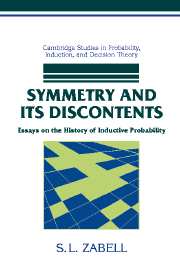Book contents
- Frontmatter
- Contents
- Preface
- PART ONE PROBABILITY
- PART TWO PERSONALITIES
- 5 The Birth of the Central Limit Theorem [with Persi Diaconis]
- 6 Ramsey, Truth, and Probability
- 7 R. A. Fisher on the History of Inverse Probability
- 8 R. A. Fisher and the Fiducial Argument
- 9 Alan Turing and the Central Limit Theorem
- PART THREE PREDICTION
- Index
8 - R. A. Fisher and the Fiducial Argument
Published online by Cambridge University Press: 05 June 2012
- Frontmatter
- Contents
- Preface
- PART ONE PROBABILITY
- PART TWO PERSONALITIES
- 5 The Birth of the Central Limit Theorem [with Persi Diaconis]
- 6 Ramsey, Truth, and Probability
- 7 R. A. Fisher on the History of Inverse Probability
- 8 R. A. Fisher and the Fiducial Argument
- 9 Alan Turing and the Central Limit Theorem
- PART THREE PREDICTION
- Index
Summary
Abstract. The fiducial argument arose from Fisher's desire to create an inferential alternative to inverse methods. Fisher discovered such an alternative in 1930, when he realized that pivotal quantities permit the derivation of probability statements concerning an unknown parameter independent of any assumption concerning its a priori distribution.
The original fiducial argument was virtually indistinguishable from the confidence approach of Neyman, although Fisher thought its application should be restricted in ways reflecting his view of inductive reasoning, there by blending an inferential and a behaviorist viewpoint. After Fisher attempted to extend the fiducial argument to the multiparameter setting, this conflict surfaced, and he then abandoned the unconditional sampling approach of his earlier papers for the conditional approach of his later work.
Initially unable to justify his intuition about the passage from a probability assertion about a statistic (conditional on a parameter) to a probability assertion about a parameter (conditional on a statistic), Fisher thought in 1956 that he had finally discovered the way out of this enigma with his concept of recognizable subset. But the crucial argument for the relevance of this concept was founded on yet another intuition – one which, now clearly stated, was later demonstrated to be false by Buehler and Feddersen in 1963.
Key words and phrases: Fiducial inference, R. A. Fisher, Jerzy Neyman, Maurice Bartlett, Behrens-Fisher problem, recognizable subsets.
- Type
- Chapter
- Information
- Symmetry and its DiscontentsEssays on the History of Inductive Probability, pp. 161 - 198Publisher: Cambridge University PressPrint publication year: 2005



